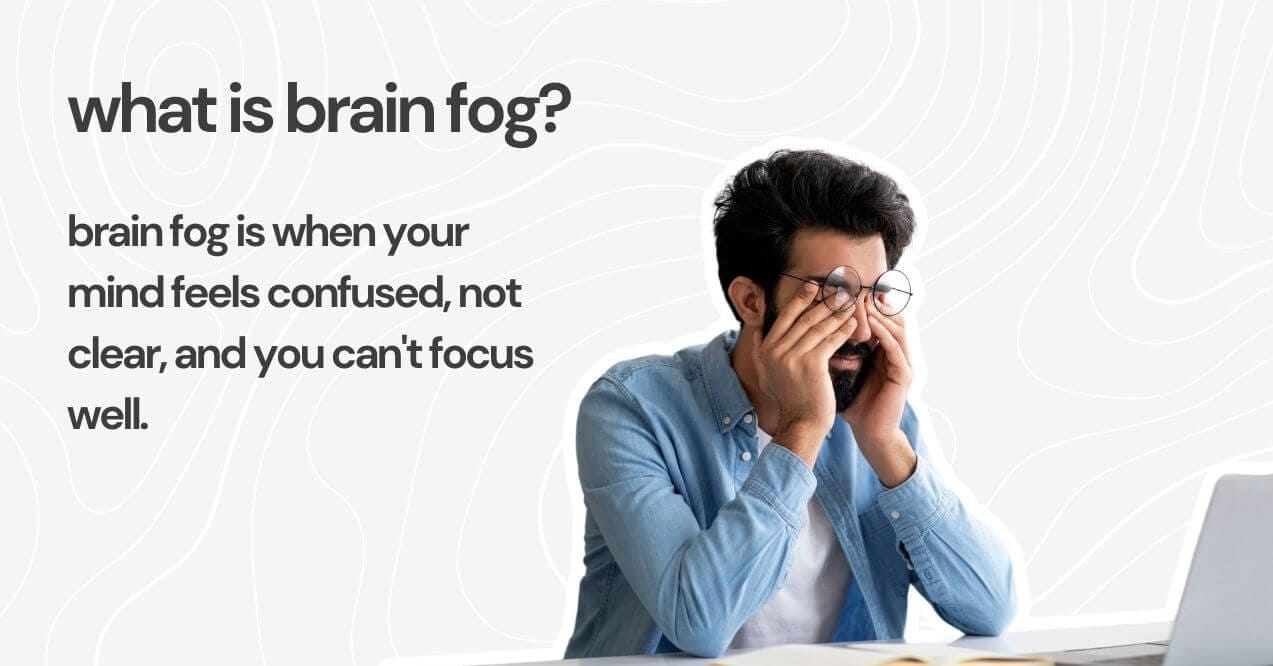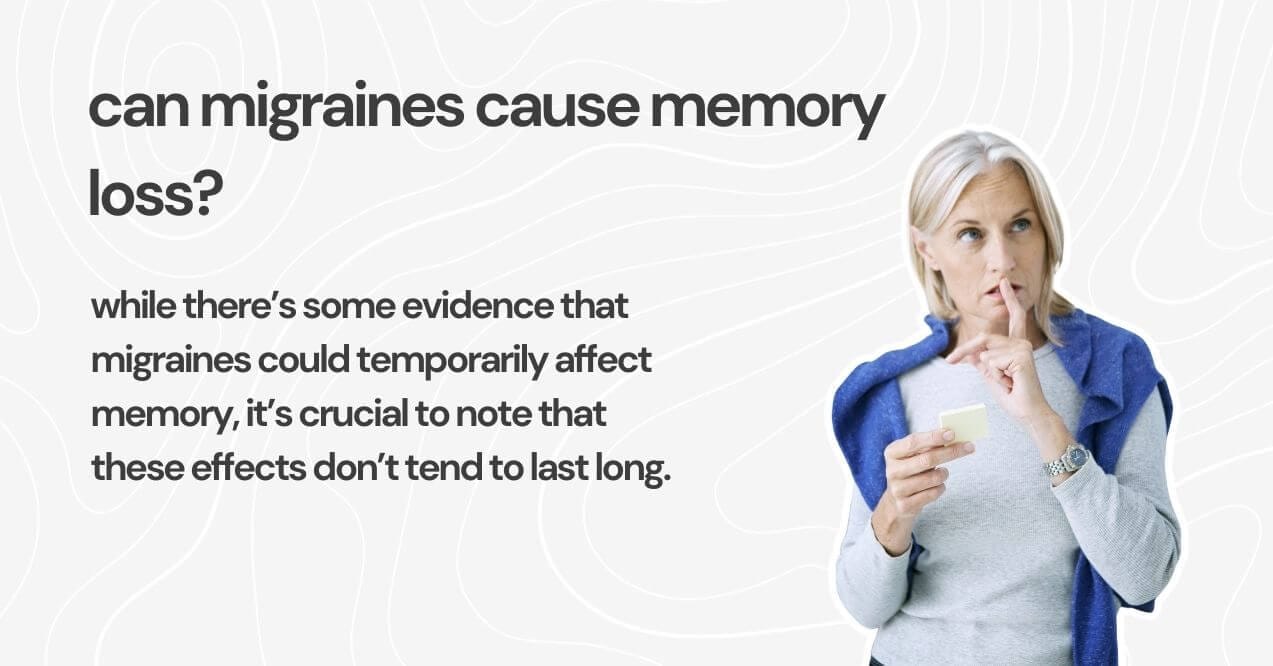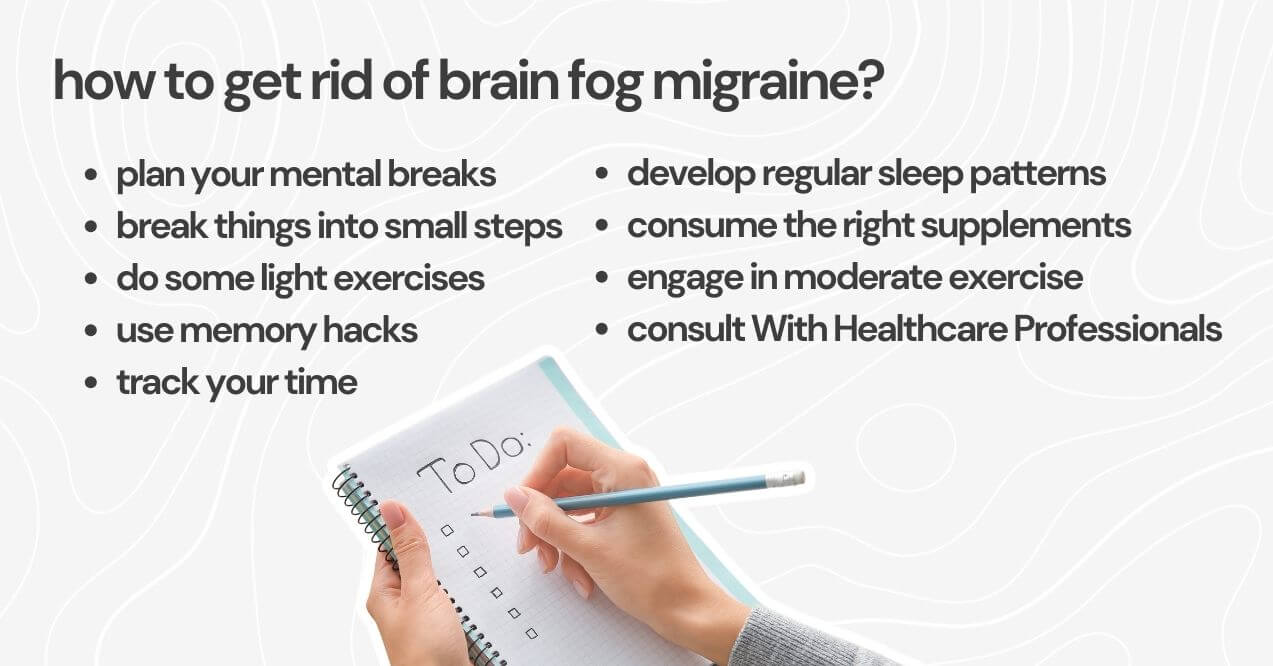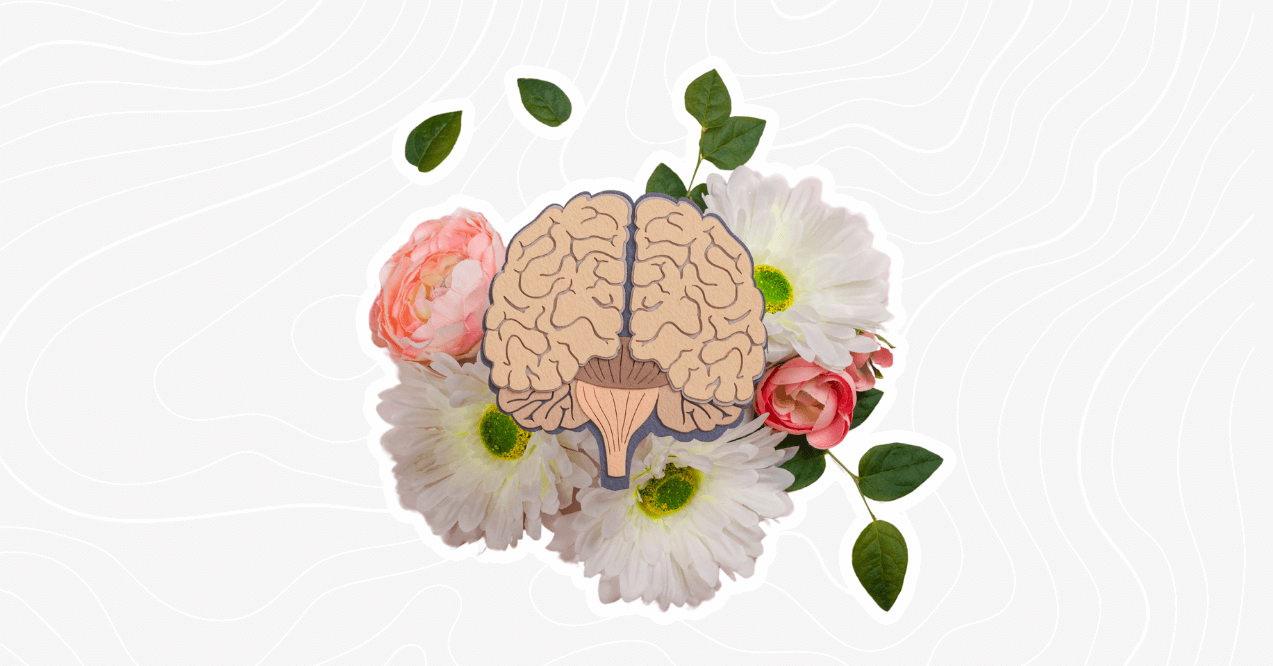How to Get Rid of Brain Fog Migraine and Achieve Mental Clarity
Do you want to know how to get rid of brain fog migraine? It can be extremely tiring going through your days without the ability to think clearly. Just imagine being forgetful and confused for a big chunk of your day. Let’s not ignore the fatigue that ensues, resulting in an even harder time navigating daily tasks. If you constantly feel like your brain is in a fog, making it hard to think clearly, it’s time to find out what it’s all about.
It’s undeniable that life isn’t complete without responsibilities and worries. However, you’d also agree that learning how to clear the fog associated with migraines is within reach. By identifying the root causes of the issue, you’ll be in a better position to navigate daily tasks with a clear mind, make more effective decisions, and become more productive.
In addition to these strategies, consider incorporating not only the best supplements for mental clarity in the market but also superfood powders to boost essential nutrient intake and muscle recovery supplements to help alleviate fatigue and support overall well-being. For instance, using ashwagandha for brain fog has been shown to be beneficial in enhancing cognitive performance and reducing stress. Continue reading to discover scientifically proven strategies that equate to brighter days, unlocking your full potential!
Key findings:
What Is Brain Fog?

Brain fog is when your mind feels confused, not clear, and you can’t focus well. It can be due to various reasons, but all of them have one thing in common: they make it hard for your brain to work properly. Inside your brain, there’s a complicated dance between neurons and neurotransmitters that control your thoughts and memories. But when you have brain fog, this dance doesn’t go smoothly, messing up how your brain usually works.
There are many reasons for brain fog, and they’re as complicated as your brain. Stress, not getting enough rest, and not eating well can mess up the balance of chemicals in your brain. Stress, for example, releases a hormone called cortisol that can tire your brain out. This hormone messes with your brain’s powerhouses, called mitochondria, making it hard for them to give your brain the energy it needs.
Not getting good sleep also stops your brain from fixing itself and getting rid of waste, making it hard for your brain to work right. Eating the right foods is important, too. If you don’t get enough of the nutrients your brain needs, like omega-3 fatty acids, it can’t make the chemicals it needs to work well.
But don’t worry, there are ways to clear away brain fog and feel better. Using solutions like herbs for mental clarity can help. As you read on, you’ll realize that knowing how to get rid of brain fog migraine is simple but requires a conscious effort.
What Does the Research Say About Migraine Brain Fog?

Recent studies exploring the link between migraines and brain fog provide interesting insights into how these two are connected. When you experience intense discomfort during migraines, it’s because certain neurons in your brain are overly stimulated. This excessive activity leads to a form of head discomfort that starts a chain reaction, making it hard for you to think clearly.
This disruption in your brain, which shows up as a decline in your thinking abilities, is the first clue to understanding the mysterious fog that clouds our brains during migraines. Going deeper into the world of neurons, things get even more complicated. The increased firing of neurons during migraines might change the patterns of brainwaves, which are crucial for clear thinking. This alteration in brainwave patterns can cause mental haziness.
Additionally, during migraines, there’s a rise in the levels of a neurotransmitter called GABA, which usually helps calm down neurons. This discovery opens up promising paths for more research. Another layer to this complexity is the impact of poor sleep patterns. Sleep is vital for the brain to recover and stay sharp. If migraines disrupt your sleep, it might contribute to prolonged brain fog. This is why sleep is a key factor in figuring out how to get rid of brain fog migraine.
Digging deeper into the connection between migraines, sleep problems, and brain fog could reveal crucial insights into this complicated situation. Scientists are still puzzled by the intricate links between migraines and brain fog. Despite that, however, the emerging evidence gives us a bit of understanding. By knowing the connections between these events, we can start to untangle the knots in the brain. Every study gets us closer to helping those who go through this confusing experience.
While we’re waiting for clearer answers, making lifestyle changes like practicing mindfulness and ensuring you get enough sensory input can help ease cognitive fog. Though not definitive solutions, these steps might provide some relief from the challenging combination of migraines and brain fog.
Can Migraines Cause Memory Loss?

Scientists are actively studying the connection between migraines and memory loss. They’re trying to figure out if there’s a link between the intense headaches and problems with thinking and remembering things. Some studies suggest that the intense brain activity during migraines might affect how our memory works.
When a migraine happens, it sets off a series of chemical reactions in the brain, making our senses super alert. This extra alertness might mess up the usual communication in our brains. It could also affect our memory.
To understand how to deal with brain fog during migraines, it’s important to know about something called cortical spreading depression (CSD). CSD is like a wave that moves through the brain, possibly messing up normal brain function and impacting how we think. Neurotransmitters, like glutamate, which help with memory, might be affected during this intense brain activity.
While there’s some evidence that migraines could temporarily affect memory, it’s crucial to note that these effects don’t tend to last long. Some early signs suggest a connection between frequent migraines and problems with thinking as we get older. This might be because the brain tries to protect itself after many migraine attacks by going into a low-activity state. This protective state could subtly affect things like memory recall and flexibility in thinking.
But here’s the good news: most people who have migraines generally don’t suffer from big, long-term memory problems. Taking care of yourself with a regular sleep schedule, a balanced diet, and managing stress can help support your memory and overall brain function. Even though migraines might briefly impact how we remember things during an attack, it’s not clear if there are lasting effects.
Scientists are still studying how to get rid of brain fog during migraines, and each new discovery helps us understand more about the complex relationship between migraines and our thinking abilities.
How Long Does Brain Fog Last After Migraine?

The time brain fog lasts after a migraine can be different for each person, making it a complex thing to understand. On average, people usually feel mentally fuzzy for about 24 to 48 hours after a migraine. But it’s essential to know this is just a general idea, and various things like how often you get migraines, how bad they are, and how your brain works can make the recovery time different for everyone.
Looking more closely at how it happens in the brain, brain fog after a migraine is connected to how our nerves and blood vessels work together. During a migraine, the brain is super active, and the blood flow in the brain changes. After the migraine, the brain needs time to get back to its normal state.
Understanding this balance between active nerves and blood flow helps explain why people take different amounts of time to recover from brain fog after a migraine. Figuring out how to get rid of brain fog after a migraine means considering each person’s unique response to these changes in the brain.
Lifestyle changes are fundamental when trying to feel better after a migraine. Drinking enough water, getting good sleep, and sticking to a daily routine can help your brain recover faster. Also, doing things that boost your brain’s flexibility, like mindfulness exercises and mental workouts, can speed up returning to normal. These tips, supported by evidence, not only help shorten how long brain fog lasts but also give people the tools to actively manage their thinking impairments after a migraine.
Digging deeper into the lesser-known parts of brain fog after migraines reveals that solving the puzzle needs many different ways. Understanding how nerves and blood vessels work together and finding what works for each person can give them the power to handle and maybe make the time they feel mentally foggy after a migraine shorter. As scientists keep learning more about all the things involved in post-migraine brain fog, people can use this knowledge to take care of their minds and well-being after migraines.
Symptoms of Migraine Brain Fog
People dealing with this condition may experience a mix of symptoms like feeling mentally tired, having trouble concentrating, and facing difficulty remembering things. The key thing is that these symptoms come and go, fitting closely with the pattern of migraines. The reasons behind these symptoms involve changes in blood flow to the brain and cortical spreading negative thoughts, which is closely connected to the process of migraines.
It’s important to recognize and separate migraine-related brain fog from the usual mental haziness caused by different stresses. The cognitive issues linked to migraines often happen before or during the headache phase, setting them apart.
Knowing these small differences helps in figuring out how to deal with brain fog during migraines in a way that suits each person. Also, the specific interaction of brain chemicals like serotonin and dopamine plays a role in the unique cognitive symptoms seen in people with migraines.
Looking into the details of how the brain works during migraines shows that it’s not the same as the normal ups and downs in thinking. Changes in how brain cells communicate, along with increased sensitivity to things around, give a clear picture of how genes, surroundings, and nerve signals come together during migraines.
Understanding this viewpoint is crucial for people trying to grasp how much migraines affect their daily lives. It emphasizes the need for personal strategies to cope with these challenges.
Migraine brain fog doesn’t just impact thinking; it also connects with emotions and mental well-being. Making changes in your daily life, managing stress, and doing exercises that focus on thinking can be crucial in building mental strength.
People can actively face the difficulties caused by migraine-related brain fog, leading to a better life quality. This involves recognizing how the brain works during migraines and using personalized strategies to cope with it.
How to Get Rid of Brain Fog Migraine

When dealing with how migraines affect thinking, it’s important to look at strategies that not only help with symptoms but also keep the brain healthy. Let’s explore some science-backed tips for clear thinking that go beyond the usual, giving a special perspective on fighting the mysterious brain fog linked to migraines.
Plan Your Mental Breaks
In the complex orchestra of how the brain works, taking well-timed mental breaks can make a big difference. Studies show that planned pauses can boost thinking and help lessen the impact of migraines. Try adding short breaks to your daily routine to give your mind a quick refresh and keep your brain working at its best.
Break Things Into Small Steps
Breaking down complicated tasks into smaller steps is like giving your brain a clear roadmap. Scientifically, dividing activities into parts can make your thinking more efficient and reduce the mental strain linked to migraines. Embrace the idea of breaking things into smaller pieces to handle tasks with clear and precise thinking.
Do Some Light Exercises
Doing light exercises sparks up your brainpower. Research shows that physical activity encourages neuroplasticity, creating a setting that supports clearer thinking. Add brisk walks or gentle yoga to your routine to refresh your mind without putting too much stress on it.
Use Memory Hacks
Discover the power of your memory by using clever memory tricks. Scientifically proven methods, like association and visualization, can boost your ability to remember things, giving you a valuable tool to tackle cognitive issues related to migraines. Try out these tricks to strengthen your mental skills.
Track Your Time
Managing your time isn’t just about getting things done; it’s a way to protect your thinking. Scientific research shows that keeping track of your time well makes your thinking more efficient and reduces the impact of migraines on how you think. Using thoughtful time management strategies can help clear up your mind.
Develop Regular Sleep Patterns
The significant effect of sleep on thinking is clear. Having a regular sleep routine is good for your brain. Scientifically, getting enough consistent sleep helps boost memory, focus, and overall mental strength. Make sure to prioritize your sleep to strengthen your brain against the impact of migraines.
Consume the Right Supplements
Have you heard of the immense power of mushrooms for mental clarity? We’re talking about reishi, cordyceps, and turkey tail, to name a few. These, combined with colorful fruits, such as blueberries, strawberries, and raspberries, are great at increasing focus and reducing fatigue. Including all these ingredients in your meals might be challenging. That’s why we’re introducing Trumeta Reds.

Trumeta Reds promises to boost your vitality and well-being, offering more than just a refreshing drink. This product aims to enhance your metabolism, leaving behind those uncomfortable bloating experiences. The potential benefits extend beyond physical well-being, as users report elevated cognitive function, contributing to improved brainpower.
Many have found that incorporating Trumeta Reds into their daily routine has positively impacted their overall energy levels and mental clarity. To discover how the product drives change, check out the hundreds of reviews on Trumeta’s website.
In the pursuit of vibrant health and genuine well-being, Trumeta Reds is gaining attention as a noteworthy addition to daily self-care rituals. Dive into the experience and explore the potential benefits that users are raving about. It’s time to consider Trumeta Reds as part of your journey toward a more engaged and vital life.
Engage in Moderate Exercise
Getting moderate exercise proves to be a strong supporter in the fight against brain fog. Research highlights the mental advantages of regularly engaging in moderate physical activity, from better attention to an improved mood. Add exercises like swimming or cycling to strengthen your cognitive defenses.
Consult With Healthcare Professionals
To tackle the complex problems linked to cognitive issues during migraines, it’s crucial to seek guidance from healthcare professionals. Getting advice from experts can help create personalized strategies based on your unique brain makeup. Work together with professionals to develop a comprehensive plan to ease and support your cognitive well-being.
Conclusion
In our quest to beat brain fog during migraines, we’ve found simple but effective strategies. From taking short breaks to using memory tricks and going for brisk walks or yoga, we’ve looked at ways to strengthen our thinking. Breaking tasks into smaller steps is like giving your brain a useful map, and mindful time management is not just about being productive—it protects your thinking.
Science tells us that dealing with migraine-related brain fog doesn’t always mean using complicated medicines or having surgeries. Some of the recommendations in this article include:
- Good quality sleep
- Regular exercise
- Professional guidance
- Natural supplements
These are like superheroes in our quest for mental clarity. These practices can be our allies in the battle against the enigmatic brain fog associated with migraines.
Let’s use these ideas in our daily lives, appreciating simple strength and understanding how our brains function. It’s not just about handling migraines; it’s about building a strong and lively mind. Join this journey with curiosity and optimism, equipped with practical tools to care for our minds and live our best, free from brain fog.
Simple changes in your lifestyle can really help reduce how often and how strong migraine brain fog hits. Things like making sure you get enough sleep regularly, using mindfulness practices to handle stress, and eating a balanced diet with magnesium can make a big difference. These steps help keep your brain healthy by dealing with triggers and boosting how well it works.
Migraine brain fog can be upsetting, but usually, it’s a short-term issue linked to migraines. It doesn’t necessarily mean there’s a serious brain problem. Still, if the symptoms stick around or get worse, it’s smart to talk to a professional. They can check for any hidden issues and help figure out personalized ways to keep your brain healthy.
Advertisement. This site offers health, wellness, fitness and nutritional information and is designed for educational purposes only. You should not rely on this information as a substitute for, nor does it replace, professional medical advice, diagnosis, or treatment. If you have any concerns or questions about your health, you should always consult with a physician or other health-care professional. Do not disregard, avoid or delay obtaining medical or health related advice from your health-care professional because of something you may have read on this site. The use of any information provided on this site is solely at your own risk.





